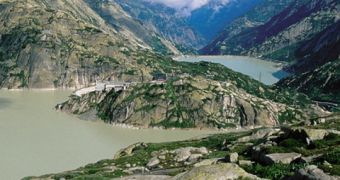Ever since 2009, the people living in Guttannen, a small village in the Bernese Alps, have been living in constant fear that their community might be wiped out by rockfalls and landslides.
Scientists argue that this situation is due to global warming impacting on the permafrost here.
For those unaware, permafrost is basically frozen soil. Therefore, it is highly susceptible to increases in global and local temperatures, meaning that, much like Arctic glaciers, it can thaw and begin to break down.
Once such major incident occurred in July 2009, and from that moment on several smaller-scale rockfalls have been reported quite often, particularly during summer months.
As one can easily guess, this phenomena poses significant risk for the people living in close proximity to said permafrost.
IPS reports that Nils Hählen, an engineer who has been studying the changes occurring in the permafrost here for quite some time now, explains that: “These mudslides as well as the volume of transported rubble have grown from year to year.”
Apparently, it is expected that it will only take about five to seven years before some of the households here will be severely affected by formerly-frozen soils caused to break down by significant increases in local temperatures.
What is even more troubling is that, as geologists informs us, nearly 5% of Switzerland’s surface area is made up of permafrost, which means that, should global warming remain unhindered, other parts of this country might also be at risk in the not-too-distant future.
One researcher argues that, “Much of the data points to permafrost degradation. For example, in the past three years active layer depths in summer have increased with new record values at many of the observed sites.”
Given the fact that melting permafrost is quite unpredictable, in the sense that one cannot anticipate when and where the next rockfall is going to take place, it seems that the only option to prevent such disasters from occurring is to put a leash on climate change and global warming.

 14 DAY TRIAL //
14 DAY TRIAL //